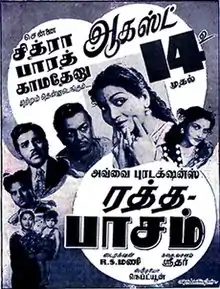Ratha Paasam (1954 film)
Ratha Paasam (transl. Blood affection) is a 1954 Indian Tamil-language drama film directed by R. S. Mani, written by C. V. Sridhar and produced by T. K. Muthusamy. The film stars T. K. Shanmugam, T. K. Bhagavathi, Anjali Devi, M. S. Draupadi, T. S. Balaiah and N. R. Vidyavathi. It is based on Sridhar's play of the same name. The film was a commercial success, and was later remade in Hindi as Bhai-Bhai (1956).
| Ratha Paasam | |
|---|---|
 Theatrical release poster | |
| Directed by | R. S. Mani |
| Written by | C. V. Sridhar |
| Based on | Ratha Paasam by C. V. Sridhar |
| Produced by | T. K. Muthusamy |
| Starring | T. K. Shanmugam T. K. Bhagavathi Anjali Devi T. S. Balaiah |
| Cinematography | Nemai Gosh |
| Edited by | K. Govindasamy |
| Music by | M. K. Athmanathan A. V. Natarajan |
Production company | Auvai Productions |
Release date |
|
Running time | 179 minutes[1] |
| Country | India |
| Language | Tamil |
Plot
Raja is a petty thief living around the streets of Bombay, indulging in pickpocketing. In the same city lives Rani, who makes a living through dancing. The two meet and fall in love. Raghu, the owner of a cycle company, lives luxuriously with his wife Sarala and children in Madras. Madhu, his manager, has been misappropriating the company's funds with the help of his lover Manorama who Raghu is later attracted to. The company is soon closed due to losses, putting Sarala and her children in poverty.
Raghu leaves for Bombay to seek new ventures, leaving his family behind. Sarala goes in search of him. One day, Raja steals Raghu's purse and discovers in it photographs which reveal that Raghu is his long-lost brother. He goes in search of Raghu, who does not recognise him. Sarala faces many troubles and after several incidents, all problems are solved and the family reunites.[2]
Cast
- T. K. Shanmugam as Raja[2]
- T. K. Bhagavathi as Raghu[2]
- Anjali Devi as Rani[2]
- M. S. Draupadi as Sarala[2]
- T. S. Balaiah as Madhu[2]
- N. R. Vidyavathi as Manorama[2]
Production
When he was 17−18 years old, C. V. Sridhar wrote a story named Latchiyavathi and approached AVM Productions with the intention of making it a film, but AVM director P. Neelakantan rejected it.[3] The story was later picked up for the stage by T. K. Shanmugam's troupe, T.K.S. Brothers and staged as Ratha Paasam.[1] The play's film adaptation would later be produced by Shanmugam's brother T. K. Muthusamy under the banner "Auvai Productions", and directed by R. S. Mani. The screenplay was written by Sridhar.[4][1] Cinematography was handled by Nemai Ghosh, and the editing by K. Govindasamy.[4] Shanmugam and his other brother Bhagavathi, who acted in the play, reprised their roles in the film adaptation.[1] Shooting took place at Neptune Studios, later known as Dr. MGR-Janaki College of Arts and Science for Women.[2]
Soundtrack
Music was composed by M. K. Athmanathan and A. V. Natarajan while the lyrics were penned by M. K. Athmanathan and Ku. Ma. Balasubramaniam. Playback singers are P. Leela, M. L. Vasanthakumari, Jikki, K. Rani, Kantha, (Radha) Jayalakshmi, Thiruchi Loganathan, A. M. Rajah and S. C. Krishnan.[5] The song "Dullu... Dullu... Very Dullu..." is a satire on the economic situation and hypocrisy of Madras in the 1950s and of how people then lived their lives.[2]
| Song | Singer/s | Lyricist | Duration |
|---|---|---|---|
| "Maamogam Aanaen" | Jikki | 03:23 | |
| "Dallu Dallu Dallu" | Thiruchi Loganathan | 03:03 | |
| "Enge Selvayo" | A. M. Rajah & Kantha | ||
| "Aiyappaa Idhu Meiyappaa" | S. C. Krishnan | 03:09 | |
| "Aanandha Vaibogam" | Jikki & K. Rani | M. K. Athmanathan | 03:18 |
| "Jegam Yaavume" | Radha Jayalakshmi | ||
| "Panam Irukkira Manushangitta" | P. Leela | Ku. Ma. Balasubramaniam | 02:31 |
| "Nilaiyaana Inbam Manavaalan Anbe" | M. L. Vasanthakumari | 03:23 | |
| "O En Raajaa" | P. Leela | M. K. Athmanathan | 05:31 |
| "Paadhakam Seivadhum...Udan Pirandhavan" | A. M. Rajah | M. K. Athmanathan | 03:05 |
Release and reception
Ratha Paasam was released on 14 August 1954.[4] The film was a commercial success, and film historian Randor Guy said it would be "Remembered for: the moving story, commendable performances and the song ‘Dullu... dullu... very dullu...’".[2]
References
- Rajadhyaksha, Ashish; Willemen, Paul (1998) [1994]. Encyclopaedia of Indian Cinema (PDF). British Film Institute and Oxford University Press. p. 338. ISBN 0-19-563579-5.
- Guy, Randor (13 April 2013). "Blast from the Past: Rattha Paasam 1954". The Hindu. Archived from the original on 10 September 2013. Retrieved 5 October 2016.
- "தமிழ்த் திரை உலகில் திருப்பம் உண்டாக்கிய டைரக்டர் ஸ்ரீதர்". Maalai Malar (in Tamil). 18 March 2012. Archived from the original on 23 March 2012. Retrieved 8 November 2019.
- Film News Anandan (23 October 2004). Sadhanaigal Padaitha Thamizh Thiraipada Varalaru [History of Landmark Tamil Films] (in Tamil). Chennai: Sivakami Publishers. Archived from the original on 13 May 2017.
- Neelamegam, G. (December 2014). Thiraikalanjiyam — Part 1 (in Tamil) (1st ed.). Chennai: Manivasagar Publishers. p. 81.
- Narasimham, M. L. (23 March 2016). "Pellikanuka (1960)". The Hindu. Archived from the original on 17 May 2016. Retrieved 25 August 2018.
- Muthuraman, S. P. (1 April 2015). "சினிமா எடுத்துப் பார் 2 - எடிட்டிங் அறிவு" [Try making a film, part 2 – Editing genius]. Hindu Tamil Thisai. Archived from the original on 8 November 2019. Retrieved 8 November 2019.
External links
- Ratha Paasam at IMDb